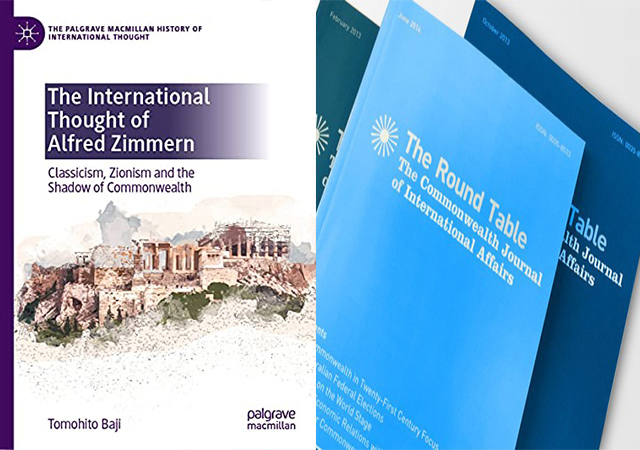
[This is an excerpt from an article in The Round Table: The Commonwealth Journal of International Affairs.]
Alfred Zimmern, the International Relations pioneer, civil servant, and early contributor to The Round Table is the subject of Tomohito Baji’s first book. Originally his PhD thesis, Baji examines the thinking on international politics of one of the most influential International Relations (IR) specialists of the first half of the twentieth century. Zimmern’s influence on world politics has been explored a number of times in the last two decades – notably in Jeanne Morefield’s Covenants Without Swords (2004) and Mark Mazower’s No Enchanted Palace (2008), both of which focus on Zimmern’s thinking and career in the interwar period when he was at his most influential. Baji’s work is the first major study to focus exclusively on Zimmern’s political thought and traces its development over the course of his fifty-four-year long career. Baji’s book is a revisionist study of IR history and starts by dispelling one of the most enduring myths surrounding Zimmern, that he was one of the interwar idealists dismissed by E. H. Carr. This is a label that Baji summarily rejects, arguing that it has been forced upon Zimmern by post-World War Two Realists to establish their own superiority. Instead, Zimmern’s thinking was developed in response to the changing political realities that he was presented with in an era of global conflict and a commitment to British imperialism. Baji treats the reader to an in-depth discussion of the influences and changes to Zimmern’s complex understanding of international politics in a period of systematic change.
Perhaps, Baji’s biggest contribution to the study of this early practitioner of IR is his stress on the twin influences of Burkeian liberalism and cultural Zionism that informed Zimmern throughout his career. Of these influences it is cultural Zionism that is the more interesting and seems to have had the greatest impact on Zimmern’s conception of world politics and, in particular, his proposals for reforming the British Commonwealth and Empire. Zimmern’s idealised Commonwealth would influence his political writings throughout his life and serve as model of how to organise world politics, even as the Empire dissolved after 1945. Baji shows how Ahad Ha’am, a Russian Zionist who advanced a cultural understanding of Jewish nationhood, influenced Zimmern’s thinking on the relationship between the nation and state. It is to Ha’am that Baji traces Zimmern’s concept of deterritorialised global nations that are detached from political statehood, not to nineteenth century British philosophy as others have.
Chapter three, which focuses on the influence of cultural Zionism on Zimmern’s political thought is, perhaps, the most interesting of the book. Of particular note in this chapter is the discussion of Zimmern’s attitude to race and imperialism. Baji successfully illustrates Zimmern’s racial hierarchy, which unlike his contemporaries was not based on biological superiority, but rather on the acceptance of liberal Western values. This hierarchy placed Western Europeans at the top, alongside non-Western countries that he saw as adopting Western values, such as the Japanese, followed by colonial territories, such as India, that he saw as in the process of adopting these values. At the bottom of Zimmern’s hierarchy were non-white Asian and African people who were placed under colonial rule or League of Nations Mandate until they had adopted Western values and culture. This is an important facet of Zimmern’s thinking on British imperialism and key to understanding the Commonwealth between the World Wars. But such an important topic would have been better served as an independent chapter, rather than forming the conclusion of another.
The connection between the modern Commonwealth and imperialism is an under explored subject, but a vital one in light of anti-racism protests that swept the globe in the summer of 2020. The interwar Commonwealth was not separate from British imperialism but was a new development within it. As a key ideologue of the Commonwealth, Zimmern, provides insight into how late imperial rule was legitimised through the new discipline of International Relations, and how the United Kingdom and the dominions justified their colonial project. Baji successfully explores this and provides a clear and well written summary of Zimmern’s views. The final chapter is also worth noting, as it is perhaps the only sustained study of Zimmern’s post-World War Two political thought.
The period after 1945, and before his death in 1957, represented a major shift in Zimmern’s thinking. The advent of nuclear weapons forced a shift in how Zimmern believed global politics should be organised from an intergovernmental model to one of a global super-state, although he continued to argue that the British Commonwealth provided the main example of how this was to be achieved. Throughout his life Zimmern was, as Baji terms it, an apostle of Commonwealth and he remained loyal to his idealised version of the Commonwealth as the way to overcome nationalism and as a peace project until his death. Baji’s work is a well written study into one of the early practitioners of International Relations.
Benjamin Whitlock is with the University of Aberdeen.
The international thought of Alfred Zimmern: classicism, Zionism and the shadow of Commonwealth by Tomohito Baji, Cham, Switzerland, Palgrave Macmillan, 2021.



